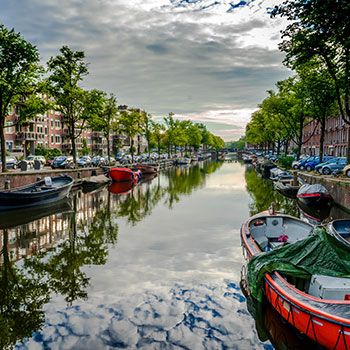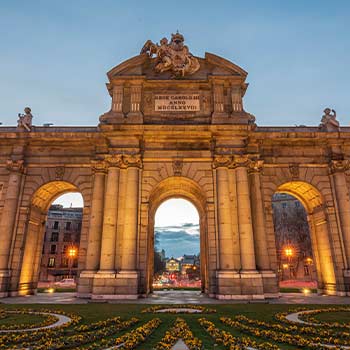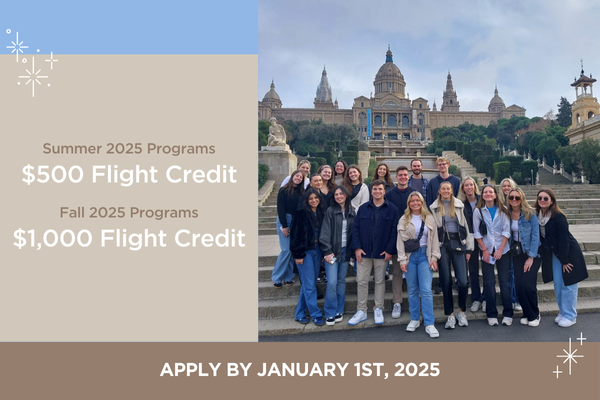The Circular Economy as a Social Innovation
Summer in Amsterdam Program
Amsterdam, Netherlands
Dates: 7/5/25 - 7/19/25

The Circular Economy as a Social Innovation
OVERVIEW
CEA CAPA Partner Institution: Vrije Universiteit Amsterdam
Location: Amsterdam, Netherlands
Primary Subject Area: Economics
Instruction in: English
Transcript Source: Partner Institution
Course Details: Level 300
Recommended Semester Credits: 3
Contact Hours: 46
DESCRIPTION
Maybe you have heard about the circular economy, and that it can help in solving environmental and social problems. But what is the circular economy, and what can it mean for our life, study, and work? In this course, you will learn about the environmental and social reasons why Europe and the Netherlands aim to transition towards a circular economy. You will also learn that this transition needs social innovations to work: Innovations in society, business, and how people relate to each other.
The current linear take-make-waste economy negatively impacts the natural and social environment. The circular economy is an alternative that promises ways to regenerate the natural environment. In addition, the circular economy also promises to enhance social justice and it relies on innovative forms of social organizing. However, despite these promises, the social aspects of the circular economy are often overlooked in teaching.
This course is one of the first to focus on the social side of the circular economy. It draws from experiences in Amsterdam, the Netherlands, and Europe, where social innovations and social justice are part of various circular initiatives. The course is also developed as part of two large research projects. A first research project investigates social innovations for the circular economy, and focuses on organizations such as Repair Cafés. A second project investigates attempts to green city buildings in a way that creates social and environmental benefits, and focuses on phenomena such as green roofs.
The course draws on previous work conducted by the (guest) teachers as part of a community focusing on people at the heart of circularity. This community consists of researchers and professionals and is organized by Het Groene Brein.
The course lasts two weeks and contains 7 lectures, 4 excursions to illustrate circularity - in nature, in the city, and in (business) organizations, and 2 one-day workshops to create social innovations for circularity.
The course contains four topics:
- What is the circular economy and what are reasons to transition towards it: 1 guest lecture, 1 lecture and 1 excursion to the forest with an international guest.
- What is the donut economy: 1 lecture and 1 excursion to the city
- What are social barriers of the circular economy: 1 lecture
- What are social innovations for the circular economy: 1 guest lecture, 1 lecture and 2 excursion to (business) organizations
These four topics are integrated in one lecture where the most effective and motivating social innovations are evaluated. This lecture is developed in collaboration with Effective Altruism, and more specifically Koen Schoenmakers (MIT, USA), the founder of an Effective Altruism student group in Rotterdam. Further practical integration happens in co-creation sessions and individual study where students investigate and create the most effective and motivating social innovations for the circular economy.
The classes and co-creation sessions will be on the VU Campus. The excursions will all be in the city of Amsterdam (such as the Amsterdamse Bos). Students will be asked to read Doughnut Economics by Kate Raworth; and 6 scientific papers on circularity. This course teaches several skills that can be applied in a practical context and in further career or study.
Forms of assessment:
Individual written assignment: students write an essay about effective and motivating social innovations for circularity Participation and presentation: students participate in sessions for co-creating social innovations for circularity and showcase their creations.
Contact hours listed under a course description may vary due to the combination of lecture-based and independent work required for each course. CEA CAPA's recommended credits are based on the contact hours assigned by Vrije Universiteit Amsterdam (VU Amsterdam): 15 contact hours equals 1 U.S. credit
The current linear take-make-waste economy negatively impacts the natural and social environment. The circular economy is an alternative that promises ways to regenerate the natural environment. In addition, the circular economy also promises to enhance social justice and it relies on innovative forms of social organizing. However, despite these promises, the social aspects of the circular economy are often overlooked in teaching.
This course is one of the first to focus on the social side of the circular economy. It draws from experiences in Amsterdam, the Netherlands, and Europe, where social innovations and social justice are part of various circular initiatives. The course is also developed as part of two large research projects. A first research project investigates social innovations for the circular economy, and focuses on organizations such as Repair Cafés. A second project investigates attempts to green city buildings in a way that creates social and environmental benefits, and focuses on phenomena such as green roofs.
The course draws on previous work conducted by the (guest) teachers as part of a community focusing on people at the heart of circularity. This community consists of researchers and professionals and is organized by Het Groene Brein.
The course lasts two weeks and contains 7 lectures, 4 excursions to illustrate circularity - in nature, in the city, and in (business) organizations, and 2 one-day workshops to create social innovations for circularity.
The course contains four topics:
- What is the circular economy and what are reasons to transition towards it: 1 guest lecture, 1 lecture and 1 excursion to the forest with an international guest.
- What is the donut economy: 1 lecture and 1 excursion to the city
- What are social barriers of the circular economy: 1 lecture
- What are social innovations for the circular economy: 1 guest lecture, 1 lecture and 2 excursion to (business) organizations
These four topics are integrated in one lecture where the most effective and motivating social innovations are evaluated. This lecture is developed in collaboration with Effective Altruism, and more specifically Koen Schoenmakers (MIT, USA), the founder of an Effective Altruism student group in Rotterdam. Further practical integration happens in co-creation sessions and individual study where students investigate and create the most effective and motivating social innovations for the circular economy.
The classes and co-creation sessions will be on the VU Campus. The excursions will all be in the city of Amsterdam (such as the Amsterdamse Bos). Students will be asked to read Doughnut Economics by Kate Raworth; and 6 scientific papers on circularity. This course teaches several skills that can be applied in a practical context and in further career or study.
Forms of assessment:
Individual written assignment: students write an essay about effective and motivating social innovations for circularity Participation and presentation: students participate in sessions for co-creating social innovations for circularity and showcase their creations.
Contact hours listed under a course description may vary due to the combination of lecture-based and independent work required for each course. CEA CAPA's recommended credits are based on the contact hours assigned by Vrije Universiteit Amsterdam (VU Amsterdam): 15 contact hours equals 1 U.S. credit








